#uzbek india
Text
Alamalglobal Healthcare is the leading provider of healthcare for international visitors seeking treatment in India's best hospitals. At Al-Amal Global, we are committed to providing patients worldwide with a comfortable and hassle-free experience. Al-Amal International is looking for the best hospital that meets the patient's needs and makes them happy without breaking the bank. We are a team of professionals whose mission is to provide a platform for patients to seek global health care. Our services include medical assistance, travel planning, consulting, assistance and financial assistance.
Our experts have many languages to answer the patient's questions, understand what needs to be done, clarify all the questions with experts with legal advice, advise the hospital pain and professional profiles, complete clinical procedures and clinical risks. Assist patients with travel, accommodation and transportation arrangements.
Our sole purpose is to be the leading guide for all patients who are looking for affordable and affordable medical services.
#health#patients#surgery#iraq#uzbekistan#uzbek india#heartsurgery#orthopaedicsurgery#healthcare services#medical oncologists
5 notes
·
View notes
Text

Professional Uzbek Translation Services by Delsh Business Consultancy
Accurate Uzbek Translation Services for legal documents, books, websites, apps, and more. Contact us today for a free quote: [email protected] more about our Uzbek Translation Services, Visit Our Website: https://www.delshlanguageconsultancy.com/
#Accurate Uzbek Translation Services#Uzbek Translation Services#Uzbek Translation Services in India#Uzbek Translation Services in Delhi#Uzbek Translation
0 notes
Text
Please note that the families listed here were chosen purely by number of speakers, as those would be the most likely to be spoken. There are still MANY more language families not listed
Some of these have over a thousand languages so I cant list all of them, but I'll list a few languages from each family and the generam geography of it under the cut
Austronesian
Languages spoken mostly in Southeast Asian archipeligos including Indonesian, Malay, Javanese (NOT Japanese), and Tagalog, among others
Sino-Tibetian
Languages spoken mostly arround East and Southeast Asia along with some parts of Central Asia including Chinese (all dialects), Burmese, Tibetic languages, and Nepali, among others
Indo-European
Languages spoken mostly around Europe and South-Southwest Asia including English, all romance languages, Greek, Albanian, German, Hindi, Bengali, and Sanskrit, among others
Afro-Asiatic
Languages spoken mostly around Northern ans Northeaster Africa, and West Asia including Egyptian, Hebrew, Arabic, Amharic, and Hausa, among others
Fun fact! When counted as a single language, Arabic alone is spoken by over half of the native speakers of Afro-Asiatic languages
Atlantic-Congo
Languages spanning most of Africa exclusing Northern parts including Fula, Wolof, Swahilli, Kirundi, Luhya, Makua, Xhosa, and Shona languages, among others
Fun fact! This family has the most languages of any language family at 1,453 total!
Dravidian
Languages spoken mostly in souther India, along with surrounding countries, including Telugu, Tamil, Kannada, Malayalam, and Brahui, among others
Turkic
Languages spoken in many countries throughout (mostly central/centeal western) Asia and Eastern Europe including Turkish, Azerbaijani, Uzbek, Uyghur, and Kazakh, among others
Fun fact! While we mostly think of Turkic languahes being from Eastern Europe and Central Asia, Proto-Turkic actually originates from East Asia around China and Mongolia! It's seldom spoken there anymore
Japonic
Languages spoken mostly in Japan (Note: NOT including the Ainu languages) including Japanese, Ryukyuan, and Hachijō, among others
Fun fact! Japanese was considered an isolate language (a language with no other languages in its family) until the Ryukyuan languages joined it in the Japonic family.
It also has the lowest number of languages of the ones listed, with 13 languages.
Should Koreanic have made it onto the list (It was JUST bekow Kra-Dai for # of speakers), that would be the lowest with only 2 languages!
Austroasiatic
Languages spoken mostly around South through East Asia Including Vietnamese, Khmer, Tagalog, among others
Fun fact! Two-thirds of people who speak an Austroasiatic language speak Vietnamese
Kra-Dai
Languages spoken mostly in Southeast Asia and Southern China including Thai, Lao, Bê, among others
#I spent an unreasonable amount of time on this#I KNOWWWW this poll is gonna be dominayed bt indo-european but
48 notes
·
View notes
Text
On the Black Death in Africa and Asia, and the interconnected Middle Ages, by Eleanor Janega
“…See, the thing is that one of the weird myths I have to deal with all the time is that the Black Death was somehow a European experience, as opposed to an Afro-Eurasian one, and that Europeans were uniquely attacked by it because of something stupid/gross/superstitious that they did that everyone else avoided. Sometimes that’s people saying Europeans killed all their cats and so rats proliferated. Sometimes its people saying that Europeans didn’t bathe and therefore germs spread. (Of course, that’s beside the point anyway, because last time I checked fleas, which are what spreads plague, DGAF about how clean you are, but OK! Europeans still bathed! I am so tired!)
Sometimes, it’s people saying that Europeans’ backwards medical ideas involving the humoral system is to blame. (The entire Arabic world also believed in the humoral system! The only thing that works to treat the plague is antibiotics! No one in the entire world had medicine that could fight this until the nineteenth century!) Sometimes its people saying that Europeans threw sewage in the streets. (They didn’t, but I’ll have to talk about that another time. And also! Plague comes from fleas! Which do not live in human excrement anyway! So that’s really beside the point! And even when it’s pneumonic not bubonic it spreads via droplets! Which are in your breath! Not excrement! Oh my god!)
But here’s the thing, if any of that were true, (and it isn’t) that would mean that the theoretically smarter rest-of-the-world wouldn’t be affected by the Black Death at all because they were having a bath with their cat next to a fully piped sewage system while not believing in humoral theory or something.
Fun fact! No.
Now we might not have a lot of sources from the totally collapsed Silk Road cities, etc., but we do have a lot from our friends in the Middle East. And they are here to tell you that everyone was having a hard time, and they had a pretty clear idea of how the plague spread.
The historian Ibn al-Wardī (c.1291 – 1349), writing in Aleppo described the onslaught of the plague thusly:
“The plague frightened and killed. It began in the land of darkness [Northern Asia]. Oh what a visitor! It has been current for fifteen years. China was not preserved from it, nor could the strongest fortress hinder it. The plague afflicted the Indians in India. It weighed upon the Sind. It seized with it’s hand and ensnared even the lands of the Uzbeks. How many backs did it break in what is Transoxiana! The plague increased and spread further. It attacked the Persians, extended its steps toward the land of the Khitai, and gnawed away at the Crimea. It pelted Rum with live coals and led the outrage to Cyprus and the islands. The plague destroyed mankind in Cairo. Its eye was cast upon Egypt, and behold, the people were wide-awake.”
“… Oh Alexandria, this plague is like a lion which extends its arm to you. Have patience with the fate of the plague, which leaves of seventy men only seven. … The plague attacked Gaza, and it shook ‘Asqalan severyly. The plague oppressed Acre. The scourge came to Jerusalem … It overtook those people who fled to the al-‘Aqsa Mosque, which stands beside the Dome of the Rock. If the door of mercy had not been opened, the end of the world would have occurred in a moment. It, then, hastened its pace and attacked the entire maritime plain. The plague trapped Sidon and descended unexpectedly upon Beirut, cunningly. Next, it directed the shooting of its arrows to Damascus. There the plague sat like a king on a throne and swayed with power, killing daily one thousand or more and decimating the population.”[6]
He died of the plague.
Later, writing in Algeria, the historian Ibn Khaldûn (1332-1406) said of the pestilence that “It swallowed up many of the good things of civilization and wiped them out. It overtook dynasties at the time of their senility, when they had reached the limit of their duration. It lessened their power and curtailed their influence. It weakened their authority. Their situation approached the point of annihilation and dissolution. Civilization decreased with the decrease of mankind. Cities and buildings were laid waste, roads and way signs were obliterated, settlements and mansions became empty, dynasties and tribes grew weak. The entire inhabited world changed. The East, it seems, was similarly visited, though in accordance with and in proportion to (its more affluent) civilization. It was as if the voice of existence in the world had called out for oblivion and restriction, and the world had responded to its call. God inherits the earth and all who dwell upon it. … it is as if the entire creation had changed and the whole world been altered”.[7]
So, this is all very depressing, but I think it’s important that I lay this all out here for everyone’s perusal. Because the thing is until we begin to approach the medieval world as an interconnected place, weird myths are going to persist. As a Europeanist I am as guilty as anyone of aiding those who want to create a world where the Black Death is a phenomenon that happened on one continent to a group of uniquely stupid people. If no one sees the sources where our friends in Asia and Africa discuss the horrors around them, then of course they are going to continue to believe that the Black Death is something that happens when the Pope takes a disliking to cats. Or something.
I’m not writing this, however, just to defend Europe. I checked, these people are all dead and probably fine. I’m writing it because persisting with the myth that everywhere other than Europe was actually an enlightened paradise does a major disservice to those histories as well. Whole communities collapsed. Death was everywhere. The historians who wanted you to understand the chaos and pain happening all around them died of that plague and if we don’t witness that, then it’s for nothing.
Further, to pretend that only idiots couldn’t figure out that this pestilence was spread by germs in fleas is actually calling all our friends in Africa and Asia stupid as well. Because they also didn’t have germ theory, and they also died in huge numbers. This does not make them foolish.
We can’t go back in time and save the hundreds of millions of people who died of the Black Death in Afro-Eurasia. What we can do from our safe distance of almost seven hundred years, behind a wall of antibiotics, is to at least do them the service of acknowledging their experience and not calling them stupid. These were real people who lived in a complex world and were doing their best in it. Frankly, if you chose to ignore their suffering and their own testaments to it, then you are the one who is ignorant.
Societies are not a hierarchy, and we don’t need to impose one. We certainly don’t need to go back in time to do that either. Ideas of a divided medieval world where people from different continents were all separate and doing totally different things do nothing but serve to uphold outdated and racist ideas of the pre-modern world. Don’t do that in a rush to condemn Europe for its modern problems.”
28 notes
·
View notes
Text
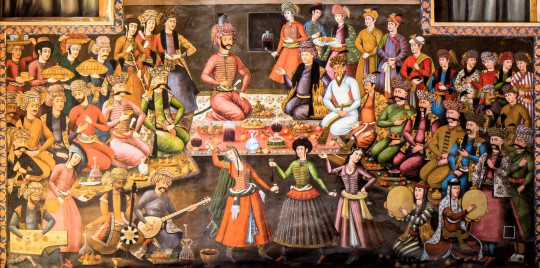
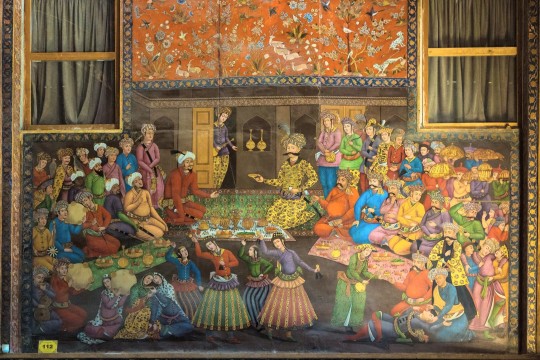
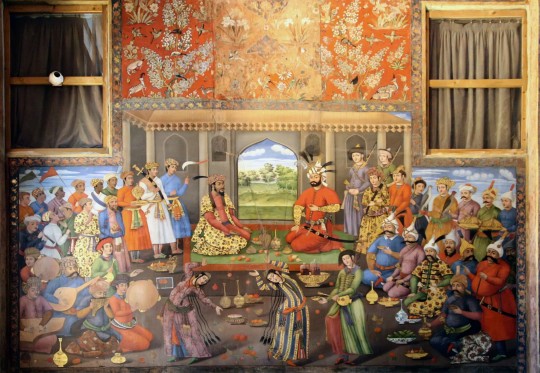
Wall paintings from Chehel Sotoun Palace; Safavid dynasty Iran, 18th century
"Shah Abbas II’s reception feast in honor of Nader Mohammad Khan, King of Turkestan"
"Abbas the Great and Uzbek ruler Vali Muhammad Khan"
"Shah Tahmasb I receiving King Homayun of India"
38 notes
·
View notes
Text


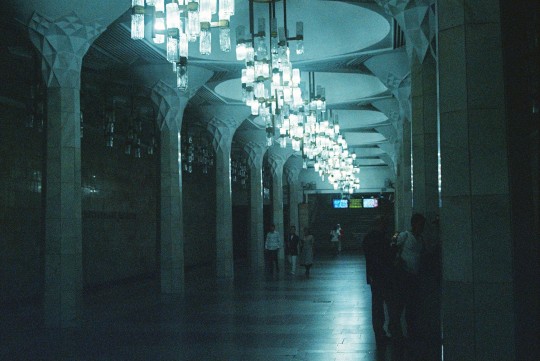
Uzbekistan (2) (3) by Caspar Tromp
Via Flickr:
(1) (2) Bukhara - Chor Minor madrasah from the 1800s. It is said that the Uzbek commissioner of this building was inspired by the Indian monuments he saw there when trading in India. Hence the four quirky minarets which have no parallels in Uzbekistan.
(3) Tashkent's Soviet era metro stations are among the most beautiful in the world. Noticeable are the reference to its traditional, Iranian-Islamic architecture, such as the muqarna capitals on the columns.
6 notes
·
View notes
Note
in regards to your previous ask, tbh even i have always thought of uyghur naan bread( bread in Xinjiang district of china) is sort of similar to Indian naan bread. i have tried both. The Xinjiang one is thicker, sort like a pizza dough I guess?? Naan is a bit thinner but that varies too.... they have a wide variety of naan breads in india.
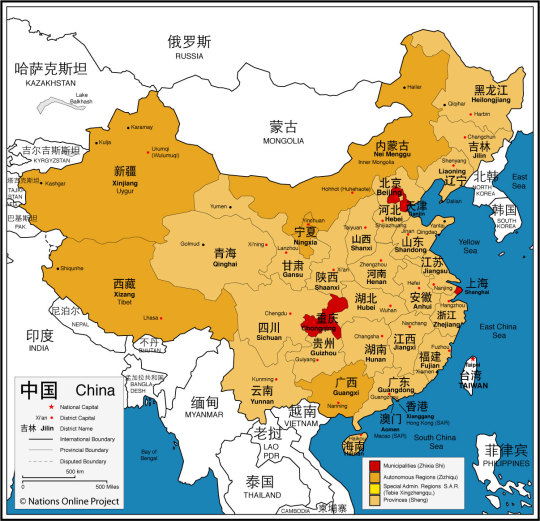
Xinjiang borders Kazakhstan, Tajikistan, Afghanistan, Pakistan, and Kyrgyzstan. Nang is a staple food for Chinese Uyghurs, Kazakhs, Kirgizs, Tajiks, Uzbeks, Tatars, and others.
There are different forms of nang.
What the history of naan spreading to other Central Asian regions from India is, is up to you all to research. I don't know anything about bread. I don't even eat bread. Thanks.
#text#answered ask#sorry for the attitude this morning but i am not an expert in anything#and so many people send me asks that never get answered bc it's something yall could just google
55 notes
·
View notes
Text
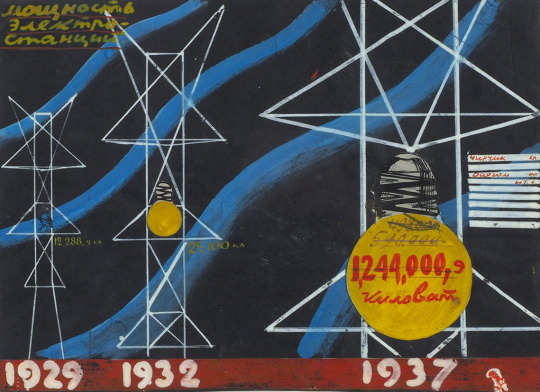
Ufimtsev Viktor Ivanovich (1899-1964) Sketch of the poster "Power of power plants". 1932.
Paper, gouache
Without a signature.
Publications: monograph "Victor Ufimtsev. We called ourselves innovators..." Moscow:, Pinakoteka, 2007, p. 89.
Painter. He studied at the Omsk Commercial School (1910-1919). Since 1917 he has been studying at painting and drawing courses at the Institute of Practical Knowledge. Together with like-minded people (N.A. Mamontov, Shabul-Tabulevich) founded the futuristic group "Chervonnaya Troika" (1921-1922). Since 1920 he worked as an artist at the Red Army Club and lecturer at the Red Army Art Studio; participated in trips on the agitation steamer "III International". In 1923 he made a trip to Moscow, where he met V.V. Mayakovsky, V.E. Meyerhold, A.N. Tolstoy. In 1923-1925 he lived in Turkestan (Tashkent, Samarkand, Bukhara); became close to A.N. Volkov, A.V. Nikolaev (Usto-Mumin), L.L. Bure, A.V. Isupov. He worked in the Samarkand Commission for the Protection of Art and Antiquities, chief artist of the Omsk Gorteatre (1926-1933), an artist of the theater named after Hamza (1933-1936). He took an active part in the creation of the Union of Artists of Uzbekistan; since 1933 he has been a member of the organizing committee, since 1940 - Chairman of the Board of the Union of Artists of Uzbekistan. In 1944 he was awarded the title of People's Artist of the Uzbek SSR. He was engaged in the organization of exhibitions, creative teams with a visit to the construction sites of the five-year plan. In the late 1950s and early 1960s, he made trips to Afghanistan, Tunisia, India; the result was a series of gouash "Afghan Diary", "Tunisia", "On the Roads of India". Creativity is represented in many museum collections, including the State Tretyakov Gallery, the State Russian Museum, the Omsk Regional Museum of Fine Arts named after M.A. Vrubel, the State Museum of Arts of the Republic of Uzbekistan in Tashkent, the State Museum of Arts of the Republic of Karakalpakstan named after I. C. Savitsky in Nukus.
Litfund
#vintage posters#study#sketch#propaganda art#russian auctions are fun#russian history#russian culture#weird russian and ukrainian art
10 notes
·
View notes
Text
Uzbek Plov done properly. Take 2.
A proper attempt at making the Uzbek Plov properly. Lamb this time and yes, we did try to do the 1:1:1 ratio of meat: carrots+onions: rice
The upturned garlic is cut off slightly at the end and soaked in the rice as it cooks at the end on slow heat (raw, but soaked rice is added at the end at the top of the meat/carrot/onion/cumin mix). With an inch of water at the top. And yes, good amount of butter also.
Heavy but ceremonial. And now I really know about the predecessor dish to the fabled Biryani — this is probably where that dish originated (rather than the stories that have been planted in the media about the nawabs of India creating it). Give credit where it’s due. Ubzek region where Babar and the Mughals came to India in the 16th century.


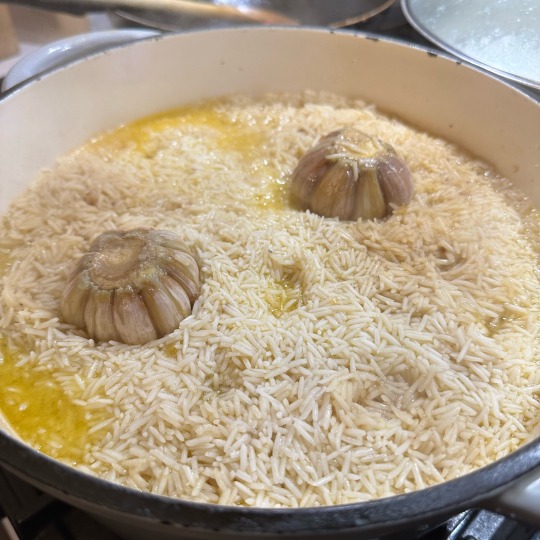

4 notes
·
View notes
Text
Low-Cost MBBS Programs in Uzbekistan for 2024
When it comes to pursuing a medical degree, the path is often perceived as an expensive and challenging journey. However, Uzbekistan has emerged as an affordable and promising destination for MBBS aspirants. This Central Asian country offers quality medical education at a fraction of the cost compared to many Western countries. In this blog, we will explore why Uzbekistan is becoming a preferred choice for MBBS programs in 2024, highlighting the key benefits, universities, and what prospective students can expect from their experience.

Why Choose Uzbekistan for MBBS?
Affordable Tuition Fees
One of the most compelling reasons to choose Uzbekistan for an MBBS Abroad is the affordability. Tuition fees in Uzbek medical universities are significantly lower compared to universities in the United States, United Kingdom, or Australia. On average, the cost of an MBBS program in Uzbekistan ranges between $3,000 to $4,000 per year, making it accessible for students from diverse economic backgrounds.
Quality Education and Accreditation
Uzbekistan is home to several universities that are recognized by international medical councils and organizations. This includes recognition from the World Health Organization (WHO), Medical Council of India (MCI), and the Educational Commission for Foreign Medical Graduates (ECFMG). These accreditations ensure that the medical programs meet global standards, providing students with a quality education that is accepted worldwide.
Modern Infrastructure and Facilities
Uzbek medical universities are equipped with modern infrastructure and facilities. They offer state-of-the-art laboratories, libraries, and research centers, ensuring that students have access to the latest medical technologies and resources. This enhances the learning experience and prepares students for modern medical practices.
Experienced Faculty
The faculty at medical universities in Uzbekistan consists of experienced and highly qualified professionals. Many professors have international experience and are well-versed in the latest medical research and practices. This ensures that students receive a comprehensive education that combines theoretical knowledge with practical skills.
English-Taught Programs
For international students, language can often be a barrier. However, many medical universities in Uzbekistan offer MBBS programs in English. This eliminates the language barrier and allows students from different parts of the world to pursue their medical education without the need to learn a new language.
Top Medical Universities in Uzbekistan
Tashkent Medical Academy
Tashkent Medical Academy is one of the most prestigious medical universities in Uzbekistan. It offers a comprehensive MBBS program with a focus on both theoretical and practical aspects of medicine. The academy is known for its research-oriented approach and collaboration with international medical institutions.
Samarkand State Medical University
Founded in 1930, Samarkand State Medical university is one of the oldest and most respected medical institutions in Uzbekistan. It offers a wide range of medical programs, including an MBBS degree. The institute is known for its excellent faculty and well-equipped facilities.
Andijan State Medical Institute
Andijan State Medical Institute is another top choice for medical students. It offers an MBBS program that is designed to meet international standards. The institute is known for its modern infrastructure and emphasis on practical training.
Bukhara State Medical Institute
Bukhara State Medical Institute offers a comprehensive MBBS program with a focus on clinical training. The institute collaborates with several international universities, providing students with opportunities for exchange programs and internships abroad.
Admission Process and Requirements
Eligibility Criteria
To be eligible for an MBBS program in Uzbekistan, students must have completed their high school education with a strong background in science subjects, particularly Biology, Chemistry, and Physics. A minimum of 50% marks in these subjects is typically required.
Entrance Examination
Some universities may require students to pass an entrance examination. This exam tests the students' knowledge in science subjects and their proficiency in English. However, many universities have simplified the admission process for international students, making it more accessible.
Application Process
The application process usually involves the following steps:
Filling out the application form: This can be done online through the university's official website.
Submitting required documents: This includes academic transcripts, passport copies, and other relevant certificates.
Paying the application fee: The fee varies from one university to another.
Receiving the admission letter: Once the application is reviewed and accepted, students will receive an admission letter from the university.
Applying for a student visa: With the admission letter, students can apply for a student visa to Uzbekistan.
Living in Uzbekistan
Cost of Living
The cost of living in Uzbekistan is relatively low compared to many Western countries. Students can expect to spend around $300 to $500 per month on accommodation, food, transportation, and other expenses. Many universities offer hostel facilities at affordable rates, further reducing the cost of living.
Cultural Experience
Uzbekistan is known for its rich cultural heritage and history. Students have the opportunity to explore historical sites, experience traditional Uzbek culture, and participate in various cultural events. This makes studying in Uzbekistan a culturally enriching experience.
Safety and Hospitality
Uzbekistan is considered a safe country for international students. The government has implemented several measures to ensure the safety and well-being of students. Moreover, the people of Uzbekistan are known for their hospitality and friendliness, making it easier for international students to adapt to the new environment.
Future Prospects
Global Recognition
An MBBS degree from Uzbekistan is recognized globally, allowing graduates to practice medicine in various countries. Graduates can also pursue further studies or specialize in their chosen field of medicine.
Internship Opportunities
Many medical universities in Uzbekistan offer internship opportunities as part of the MBBS program. These internships provide hands-on experience and prepare students for their medical careers. Some universities also have partnerships with hospitals and medical institutions abroad, offering international internship opportunities.
Career Opportunities
Graduates from Uzbek medical universities have a wide range of career opportunities. They can work in hospitals, clinics, research institutions, or pursue further studies in medical specializations. The demand for qualified medical professionals is high globally, ensuring that graduates have promising career prospects.
Conclusion
Choosing to pursue an MBBS in Uzbekistan is a smart and cost-effective decision. With affordable tuition fees, quality education, modern facilities, and a welcoming environment, Uzbekistan offers a conducive setting for medical studies. As more students discover the benefits of studying in Uzbekistan, the country is poised to become a hub for medical education in the coming years.
For students seeking a low-cost yet high-quality MBBS program, Uzbekistan is an excellent choice. With the right preparation and determination, students can embark on a rewarding medical career and make a positive impact on global healthcare.
By focusing on these key aspects and incorporating relevant keywords, this blog is designed to be SEO-friendly and provide valuable information to prospective students considering MBBS programs in Uzbekistan for 2024.
0 notes
Text
Exploring MBBS Opportunities in Uzbekistan: A Guide for Aspiring Students
Are you an aspiring medical student looking for international study options? Consider Uzbekistan as your destination for pursuing MBBS. Here's everything you need to know about studying medicine in Uzbekistan.
Why Choose Uzbekistan for MBBS?
Affordable Education: Uzbekistan offers high-quality medical education at a fraction of the cost compared to many Western countries. Tuition fees and living expenses are relatively low, making it an attractive option for Indian students.
World-Class Universities: Uzbekistan is home to several reputable medical universities recognized by international bodies such as the World Health Organization (WHO) and the Medical Council of India (MCI). These universities offer modern facilities, experienced faculty, and English-medium programs.
Clinical Exposure: Medical universities in Uzbekistan provide ample opportunities for clinical training in well-equipped hospitals. This hands-on experience prepares students for real-world medical practice.
Cultural Experience: Studying in Uzbekistan allows students to immerse themselves in the rich culture and history of Central Asia. From ancient cities like Samarkand to vibrant bazaars, there's much to explore beyond the classroom.
Admission Process for Indian Students
Eligibility: Indian students typically need to have completed their 10+2 education with Physics, Chemistry, and Biology as main subjects. Some universities may also require qualifying scores in entrance exams like NEET.
Application Procedure: Students can apply directly to their chosen Uzbekistani medical university or through authorized representatives. The application process usually involves submitting academic transcripts, passport copies, and other required documents.
Visa Process: Once accepted by a university, students need to apply for a student visa. The university will provide the necessary documents for the visa application, including an invitation letter.
Top Medical Universities in Uzbekistan
Tashkent Medical Academy: One of the oldest and most prestigious medical universities in Uzbekistan, known for its comprehensive curriculum and research facilities.
Samarkand State Medical Institute: Located in the historic city of Samarkand, this institute offers a range of medical programs with a focus on traditional and modern medicine.
Andijan State Medical Institute: Situated in the picturesque Fergana Valley, this institute provides quality medical education with a strong emphasis on practical training.
Benefits of Studying MBBS in Uzbekistan
Global Recognition: A medical degree from a recognized Uzbekistani university is accepted worldwide, enabling graduates to pursue further studies or practice medicine in various countries.
Low Cost of Living: Uzbekistan offers a relatively low cost of living compared to many other study destinations, allowing students to manage their expenses more comfortably.
Multicultural Environment: Uzbekistan's diverse population and central location make it a melting pot of cultures, providing students with a unique and enriching experience.
Career Opportunities: Indian students who graduate from Uzbekistani medical universities are eligible to take the MCI Screening Test (FMGE) to practice medicine in India. They can also explore job opportunities in Uzbekistan or other countries.
Challenges and Tips
Language Barrier: While many programs are taught in English, learning the local language, Uzbek, can enhance the overall experience and facilitate communication with patients during clinical rotations.
Cultural Adjustment: Adjusting to a new culture and environment may take time, but keeping an open mind and engaging with local communities can help students adapt more easily.
Stay Informed: It's essential for students to stay updated on visa regulations, medical licensing requirements, and other important information throughout their study journey in Uzbekistan.
Embark on your medical education journey in Uzbekistan and open doors to a world of opportunities in the field of medicine. 🩺🌍
0 notes
Text
Actually wait. More AU ideas i just remembered:
vamp hunter au: in this au uzb's a vampire hunter who wishes to successfully kill the vampire duke that terrorized their town 10 years ago and since has never let them know peace. she meets and works with turkey, a young vampire noble, whose family hates the duke. she insists that the deal is transactional: he helps her train and improve her hunting skills, she helps kill off the duke's cronies one by one until they make it to the duke himself. however, slowly she finds the vampire's presence more than just tolerable, and everything culminates when they both have to pretend to be engaged in a vampire masquerade...
she ends up killing the vampire duke, looking absolutely disheveled and injured to an inch of her life. as he immediately carries her to medical care, he can't help but stop and look at her and think she couldn't be any prettier.
vlogvamp au: turkey's a streamer/gamer who was told of an abandoned castle, in which those who enter do not come back alive to tell the tale. turns out there's a vampire living alone in this gigantic castle. he simply wishes to go and explore inside, but he can't unless she invites him: vampire rule. he tries sneaking in many other ways, getting caught each time until she gives up and invites him in so he won't cause chaos trying to come inside other ways. he slowly documents his life staying with a vampire until the playlist is 300 videos over the span of a year in which the audience can see the romance unfold themselves.
gangster au: met in elementary school, he was in third grade while uzb was in first. she once cried while playing hide and seek with him because he hid too well every time, and he gave her a tulip hairpin as an apology. she still wears it to this day, without any knowledge of that hairpin being an engagement heirloom of his family.
at some point he realizes how much he likes her, but tries to distract himself from it by uh. one night standing regularly. this is a problem because uzb's very put off by it and she's starting to avoid him more and more, whereas turkey's confused(and also sad) that she's distancing from him, especially because he still does like her.
gakuen hetalia au: uzb and india are co-presidents of the tea club. it works a bit like a cafe and a bit like a host club, in a non-romantic sense. you get to choose your tea set, they'll brew it and bring it to you, and they'll get to be your therapists for an hour or two.
turkey's in the gourmet club with france and china, and they regularly partner up with the tea club. when uzb's not listening to her guests talk about their problems, or trying to break up the sexual tension between india and china, she's trying to resist the charms of a certain turk trying to feed her baklava...
korea and taiwan are very much aware of the romantic tension between the two, and always make sure to go to the club during the collaboration window to keep up with how turkuzbek is sailing before updating their instagram account dedicated to the ship, which, by the way, has about 200 followers.
korea is also one of turkey's close friends, as well as uzbekistan's, and insists on getting them together. at some point he gets so frustrated he gives turkey a week to fess up. if he fails, korea's taking uzb out.
super mario au: in this au mario and luigi(kazakhstan and kyrgyzstan) are related to princess peach(uzbekistan). she's kidnapped by bowser(turkey) who wants to marry her. their outfits are all based on their regions(turkey has an ottoman noble fit, uzb has one of a bukharan noble/princess) and turkey sings about princess uzbekistan on his lute. unfortunately she finds him kind of attractive anyway,
actor au(is this inspired off of the fact that the main characters who fall in love in the drama mendirman jaloliddin are uzbek and turkish? yeah lol): if hetalia was a drama series. this would be sort of like crash landing on you where basically the actor and actress actually fall in love in real life, date, and eventually after a few years, get married.
they'd read thirst tweets of themselves and the other pretends not to agree wholeheartedly with them. sadik entertains these tweets for a while until he himself can't continue with how...passionate some of the tweets were. nargiza reads the first five and immediately short circuits while turkey laughs next to her. there's so many edits of them together in red carpet events or galas, and everyone loves their dynamic of flirty guy x cold, tsundere girl.
because of how well they do in the hetalia drama series, they both constantly find themselves in movies where their characters' relationships are...quite close. sometimes they're already in an established relationship as husband and wife, and sometimes it's a slowburn childhood friends to lovers deal. whatever the case, the turkuzbek fans eat it up every single time.
royal au: she's the best assassin of the kingdom that wants prince sadik dead. she spends a year in his kingdom, and slowly falls in love with him, which is a big problem since she's being paid a lot for this job–and the cost of failing is her life.
1 note
·
View note
Text
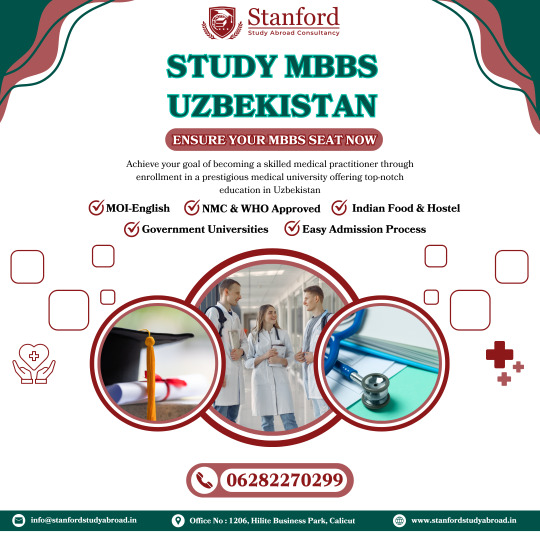
!!Looking For MBBS in Uzbekistan, Get Free Counselling Now!!
☏ +91 6282270299
Advantages of Pursuing MBBS in Uzbekistan
One notable advantage is the cost-effectiveness of studying MBBS in Uzbekistan. Compared to countries like the UK, USA, France, Korea, and other prominent nations, the expenses are significantly lower.
English is the primary medium of instruction in all universities, which attracts an increasing number of Indian students to pursue their MBBS degrees in Uzbekistan.
The quality of education provided by medical universities is outstanding and competes well with institutions in other prestigious countries. These colleges and universities boast accomplished and highly experienced faculty.
Traveling to Uzbekistan is convenient with numerous non-stop flights available from India.
MBBS degrees obtained in Uzbekistan are globally recognized by the World Health Organization (WHO) and other international medical associations.
The MBBS curriculum offered by Uzbek universities follows international standards and stays abreast of the latest medical guidelines.
There is a wide range of accommodation options available, including affordable single-housing facilities, providing students with ample choices for their stay.
Stanford Study Abroad Consultancy Calicut
Address: Office No : 1206, 2nd Floor, Phase-1 Hilite Business Park, Kozhikode, Kerala, India
Visit Us:
#studymedicine#studymbbsabroad#StudyMBBSinUzbekistan#mbbsabroad#mbbsinabroad#medicaluniversity#studymbbs#studyabroad#studyabroadconsultants#abroadconsultancy#abroadeducation#abroad #abroadstudies#abroadstudyconsultancy#abroadstudyvisa#Admissions2024#AdmissionsOpen2024#mbbsadmission2024#september2024#studyabroad2024#medicaladmission2024#BestCountryForMBBS#MedicalAdmissions#NEET#neet2024#NEETRepeater#stanford#stanfordstudyabroad#stanfordstudyabroadconsultancy
0 notes
Text
The Prospects of Study MBBS in Uzbekistan: An In-Depth Analysis
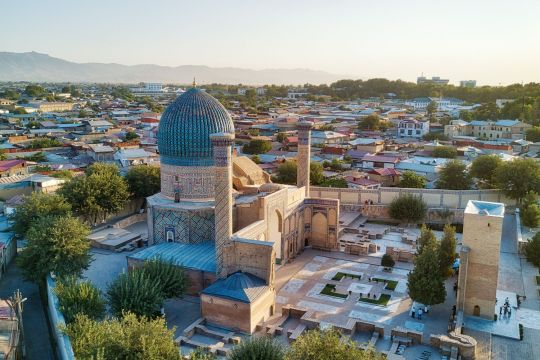
Uzbekistan has emerged in recent years as a promising destination for international students interested in pursuing a medical career. Uzbekistan’s MBBS (Bachelor of Medicine and Bachelor of Surgery) course is attractive due to its affordable tuition fees, high-quality education, and diverse cultural environment. This blog provides an in-depth analysis of the study MBBS in Uzbekistan, aiming to assist prospective medical students in making a well-informed choice.
Why choose to study MBBS in Uzbekistan?
Quality of Education
The medical universities in Uzbekistan guarantee a comprehensive education in medicine by adhering to international standards. By integrating theoretical knowledge with practical skills, we ensure that our curriculum properly qualifies students to thrive in a wide range of medical settings. The provision of English-medium courses for international students facilitates their adjustment and enhances their learning efficacy.
Affordability
In comparison to certain Asian countries and Western countries, study medicine in Uzbekistan is a more economically feasible option. The reasonable tuition fees and reduced cost of living make it an affordable choice for many students.
Global Recognition
International medical organisations such as the Medical Council of India (MCI) and the World Health Organisation (WHO) recognise degrees from Uzbek medical universities. The alumni are granted the opportunity to practice medicine in different parts across the globe, based upon their effective completion of the licencing examinations particular to their nations.
Cultural Experience
Students have the opportunity to immerse themselves in the rich history and cultural diversity of Uzbekistan while studying there. It is a chance to live in a developing nation that experiences rapid development while safeguarding its unique traditions and heritage.
The MBBS Programme in Uzbekistan
Duration and structure
In Uzbekistan, the MBBS programme usually spans a duration of six years and comprises a clinical rotation or internship of one year. The primary objective of this architectural design is to provide learners with an all-encompassing comprehension of medical science as well as practical engagement in healthcare settings.
Admission Process
The MBBS admissions procedure in Uzbekistan is uncomplicated. In addition to meeting the minimum eligibility requirements, candidates are typically required to achieve a specific percentage in science courses on their high school assessments. For the convenience of international students, the courses are taught entirely in English, and English proficiency is a prerequisite.
Curriculum
In addition to general medicine, paediatrics, general surgery, obstetrics and gynaecology, and internal medicine, the MBBS curriculum in Uzbekistan is extremely comprehensive, encompassing a wide range of medical specialties. Students receive a well-rounded medical education through a combination of classroom lectures, practical seminars, and clinical rotations.
Life in Uzbekistan for International Students
Accommodation
A large number of universities provide international students with secure and comfortable on-campus housing. Fundamental amenities furnish hostels, cultivating an environment conducive to both living and learning.
Safety
Uzbekistan is renowned for its safety and friendliness, and its crime rate is comparatively low when compared to that of other nations. The pleasant nature of the local populace towards visitors assists the adaptation process for international students.
Food and culture
The cuisine of Uzbekistan is a charming feature of its culture, providing a variety of tastes to discover. Although many may find it unfamiliar as they adjust to the local cuisine, the nation also provides a wide variety of international dishes to satisfy its diverse palate.
After Graduation
Licencing Exams
Graduates seeking to practice in a particular country must pass the licensure examinations. USMLE refers to the United States, PLAB to the United Kingdom, and FMGE to India. By passing these examinations, graduates demonstrate their skills as doctors and obtain the qualifications required for practicing in their home countries.
Career Opportunities
MBBS degrees are recognised internationally, allowing graduates to investigate career prospects in healthcare environments across the globe. Graduates have the opportunity to pursue employment in research institutes, hospitals, or delve deeply into their area of interest.
Challenges and Considerations
Language Barrier
MBBS courses are conducted in English, whereas Uzbek is the official language of the region. Academics may encounter difficulties in their daily communication beyond the confines of the university. Nevertheless, by studying fundamental Uzbek, one can overcome these obstacles and enrich their cultural immersion.
Climate
Students must possess the ability to adapt to the unique local climate, which can vary significantly across the nation. Understanding and adjustment to meteorological patterns will constitute an element of the process of adapting.
Cultural Adjustment
While adjusting to a foreign culture invariably presents obstacles, it also presents prospects for individual development. Students who choose to study in Uzbekistan should possess a receptive mindset and a readiness to acquire knowledge from the novel experiences that present themselves.
Conclusion
Pursuing an MBBS degree in Uzbekistan offers a distinctive fusion of cost-effectiveness, academic excellence, and cultural engagement. Although there are obstacles to surmount, the benefits are numerous and encompass worldwide professional prospects and individual growth. Uzbekistan provides an auspicious and enlightening medical adventure for students in search of an alternative route towards practicing medicine proficiently.
0 notes
Text
Who Will Survive in Group B?

Group B of the 2023 Asian Cup is a bit similar to Group A in terms of teams that have yet to score a goal in this current tournament.
In Group B, India and Syria have yet to find the back of the net after two matches.
Syria started the tournament with a scoreless draw against Uzbekistan and followed it up with a close 1-0 loss to Australia.

India on the other hand is not looking after starting the tourney with a 2-0 loss to group favorites Australia and a 3-0 loss to Uzbekistan.
When looking at Group B, Australia is top of the table with six points and has already clinched a spot in the second round.
On 23 January Australia will face Uzbekistan in Al Wakrah while Syria will take on India in Al Khor.
Online bookmaker Bet365 has the latest wagers and currently Australia is favored with 7/5 odds while Uzbekistan has 12/5 odds, and the odds for a draw are 19/10.

In the other match, Syria is favored with 3/10 odds while India has 9/1 odds, and the odds for a draw are 9/2.
Australia is obviously in a good position and will top the group with a win or draw against Uzbekistan.
From the standpoint of Uzbekistan, it is understandable to assume that the Uzbeks will be hoping to grind out a point against the Socceroos.
Yet it is important to realize that the Aussies will not be playing with a relaxed mindset, and I expect them to play hard for the victory.
The match between Syria and India is a little interesting just on the basis that a win for Syria will likely clinch a spot in the second round.

India is technically still alive and can book a spot in the knockout phase as one of the best third-place teams if it is able to win and score a lot of goals in the process.
But there aren’t usually a lot of surprises at the Asian Cup, and I don’t expect any in Group B.
Australia is too strong for the Uzbeks especially because the Uzbeks are without star forward Eldor Shomurodov and India cannot rely on 39-year-old striker Sunil Chhetri to save the day.
Predictions: Australia 3-1 Uzbekistan, Syria 2-1 India

【Useful Links】
・How to Open a Bet365 Account
【Latest Bookmaker Info Sports Article】
・Two Streaks Clash as Brighton Hosts Wolves in Premier League
0 notes
Text
Wednesday Wisdom: 5 of The Best Travel Books
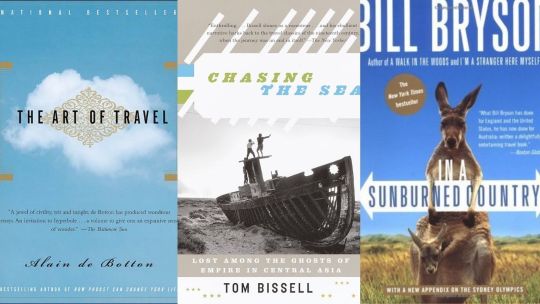
Craving adventure but want to go deeper than souvenir shops? Look no further! This week’s Wednesday Wisdom picks 5 travel books that ignite self-discovery, unravel hidden histories, and tickle your funny bone – all without leaving your armchair. From philosophical treks to hilarious Down Under romps, prepare to pack your bags (and your mind) for some truly transformative travel experiences.
Ready to explore? Dive into our picks and find your next literary adventure!
The Art of Travel by Alain de Botton
De Botton’s “Art of Travel” isn’t a guidebook, but a contemplative map to inner landscapes revealed through faraway sights. Weaving philosophy, art, and personal journeys, he asks: what do we truly seek in foreign lands? His wit sparks alongside profound insights, urging us to see travel as a tool for self-discovery, not just ticking off tourist traps. Prepare to pack lighter, think deeper, and embrace the unexpected beauty, both within and beyond the horizon.
In a Sunburned Country by Bill Bryson
Bill Bryson’s “In a Sunburned Country” takes you on a hilarious, sun-baked journey through Australia. He dives into Outback deserts, climbs ancient rainforests, and dodges Great Barrier Reef jellyfish, all while peppering in his trademark wit and self-deprecating humor. Bryson unravels the country’s history, from convict roots to quirky modern life, leaving you awestruck at its unique wildlife (think tree-climbing fish and venomous everything) and charmed by its friendly, beer-loving Aussies. It’s a laugh-out-loud love letter to a land as beautiful as it is bizarre, urging you to pack your sunscreen and sense of humor for your own sunburned adventure.
Black Lamb and Grey Falcon by Rebecca West
Black Lamb and Grey Falcon, while daunting in size, rewards the intrepid traveler with Rebecca West’s sharp intellect and vibrant prose. This Balkan odyssey blends history, personal encounters, and political insights, illuminating a complex region on the eve of WWII. Prepare for diversions – philosophical detours and passionate rants – but West’s observations on faith, war, and human nature resonate deeply. An ambitious masterpiece, requiring dedication, but offering immense intellectual and emotional returns.
The White Tiger by Aravind Adiga
A white tiger roars out of India’s underbelly in Adiga’s darkly comic debut. Balram, a cunning servant, claws his way from caste-riddled village to glittering Bangalore, fueled by ambition and a brutal pragmatism. Morality gets devoured in this picaresque tale, as Balram exposes the rotten core of wealth and exposes India’s stark class divide. Gripping, fast-paced, and deeply unsettling, “The White Tiger” leaves a tiger’s bite on your conscience.
Chasing the Sea by Tom Bissell
In “Chasing the Sea,” Bissell’s Uzbekistan is a mirage – shimmering history dances with Soviet ghosts, while the Aral Sea, shrunk by ambition, whispers tales of ecological tragedy. He stumbles alongside Rustam, an Uzbek whirlwind, dodging suspicious cops and peeling back layers of ancient cities. Laughter mingles with heartbreak as Bissell confronts empire’s legacy, weaving personal missteps with profound loss.
0 notes